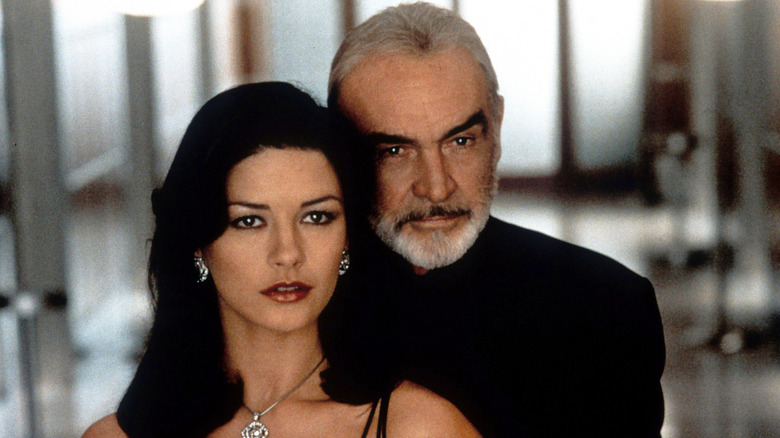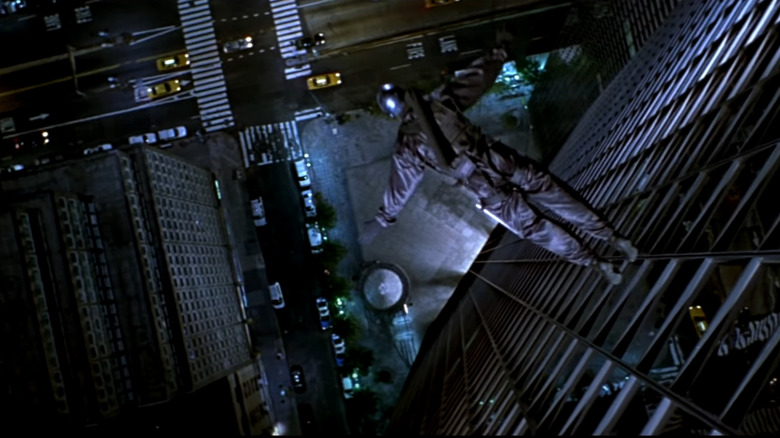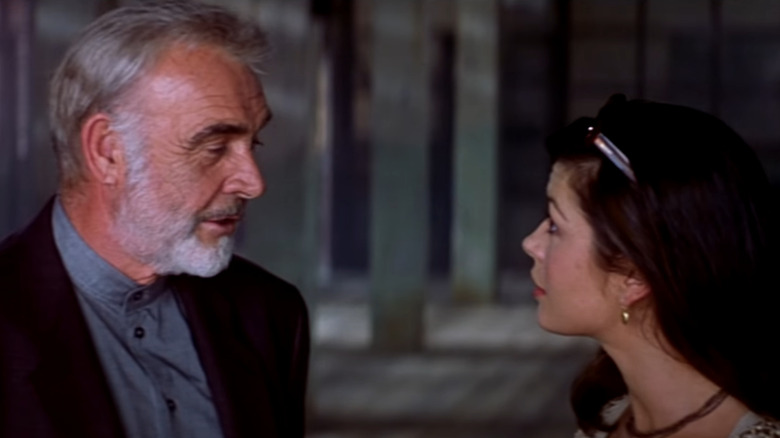Sean Connery Initially Thought Entrapment Had Too Many Special Effects
Back in the 60s, Sean Connery got a bit tired of being James Bond. The famously dedicated Scot had ambitions to become an actor celebrated for his versatility but struggled to escape the significant shadow of 007. Thankfully, over the course of the next few decades, Connery would go on to do just that. The former Bond star worked diligently to establish himself as an undeniable talent, capable of playing everything from a Soviet submarine captain in "The Hunt For Red October" to an Irish-American cop in "The Untouchables."
With his acting chops firmly established, Connery could end the 20th Century safe in the knowledge he'd escaped the trappings of Bond. And what better way to celebrate that than with a heist thriller containing many of the hallmarks of a Bond movie. Yes, 1999 would see the release of Jon Amiel's "Entrapment" — a crime caper that served more as a way to generate some sexual tension between Connery and his co-star Catherine Zeta-Jones.
The film itself was a success, bringing in $211 million at the global box office on a budget of $66 million. Much of which was down to not only Connery's pull but the multiple action set-pieces that punctuate the globe-spanning blockbuster. But beyond the impressive scale and action of "Entrapment," it was Virginia "Gin" Baker's (Zeta-Jones) pursuit of art thief Robert "Mac" MacDougal (Connery) which provided extra enticement for the audience, who were promised a front-row seat to the stars' 40-year age gap romance. And if you asked Connery at the time, it seems the veteran star was all too aware of its importance.
Too much action, not enough romance
"Entrapment" starts with a striking stunt that sees someone — presumably Connery's character — descend a skyscraper in the Manhattan night to pinch a Rembrandt painting. The action doesn't let up throughout, culminating in a heist gone wrong atop an international bank in Malaysia, whereby Connery and Zeta-Jones are suspended above Kuala Lumpur between two towers — at the time, the tallest buildings in the world. Thrilling stuff!
But in a promotional interview, Connery played down a lot of these more bombastic elements, claiming that the relationship between Mac and Gin was most important for him:
"We talk about special effects in film. In actual fact that was one of the problems in the initial film, there was too much of that sort of stuff in it. And one wanted to get closer to the relationship of a kind of older guy with a young modern woman. So we got away from that and got to this."
The final product as it exists certainly seemed to strike a balance between the action and the relationship. Even critics who found the film ultimately underwhelming — one remarked that the movie "fails as a caper film because it neglects ... a credible plot" — seemed impressed by the set-pieces and convinced by Connery and Zeta-Jones' chemistry. Had Connery, who also produced, not intervened, perhaps much of whatever appeal the film did have would have been lost.
A quasi-007 caper
Connery was clearly reluctant to let "Entrapment" veer too much into the James Bond territory from which it so clearly took several cues. As one Washington Post reviewer noticed at the time, the film "follows a quasi-007 course," which Connery was likely to have picked up on himself. As the actor said in "Entrapment's" behind-the-scenes featurette: "It's got a wit. It's got a very intriguing romantic element, and it has quite a sting in the tail at the end," — not a mention of the all-too-present action. All of which suggests he was keen to highlight the more subtle elements of the film, as evidenced by his comments about there being "too much" action in the original version of the movie.
Connery's instincts as an actor likely told him the romantic element was crucial for the movie. But the former Bond star was clearly focused on not letting that "quasi-007" aspect take too much of the spotlight. Perhaps, after decades of trying to escape the limitations of the James Bond role, the actor wasn't too excited to close out the century with a movie that contained a lot of what made Bond Bond. Had the film had a more believable plot, his efforts to tone down the action and special effects likely would have made the film a more enduring success. As it stands, you don't hear much about "Entrapment" in the discourse. Which isn't all that bad, considering the film could have become a bit of a joke — remembered more as Connery trying to relive his Bond days than as that kind of forgettable age-gap romance thriller he did.


